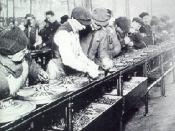Fordism is defined as an organisation of industry and work which was seen as a
system of mass production, assembly line work and strict regulation and structuring of
work tasks (lecture notes). Dramatic changes in the organisation and composition of
work over the last five decades have seen production becoming more flexible and
specialised enabling a greater variety of goods to be produced. More multi-purpose
machinery and equipment have ultimately reduced the size of the workforce thus
producing a more highly skilled and responsible workforce. The traditional
organisation of work still exists to some extent today recognised within the
McDonalds food chain industry, but there is no longer one model of work but a
variety of models in place which are constantly been adapted to the circumstances of
the individual firm and its workers. This new process of continuous change is
sometimes described as the "flexible" approach, where workplaces are high in trust
and skills (Britain at Work 1998, pp75).
This transformation has come about through
a variety of reasons, which now will be discussed in detail.
Fordism rests upon a set of techniques based on Henry Ford who founded the Ford
Motor Company in 1903. Ford saw the existing method of production as slow,
laborious and inefficient. By introducing a complex division of labour, by breaking
down the process of production into small-individualised parts, Ford reasoned
(correctly) that costs could be lowered and profits increased. This production was a
new way of thinking and doing, helped made possible by advances in machinery.
Productivity could increase whilst decreasing the amount of time needed to produce.
Through the assembly system workers had to work at the speed of the man next to
him. This meant standards were set and the speed of production was regulated. By
taking the skills and knowledge...


